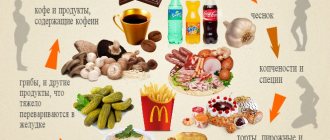This is the eighth obstetric week of pregnancy, which means 1.5 months have already passed since conception. The first trimester is in full swing, and the expectant mother probably already knows about her interesting situation. The baby inside is growing by leaps and bounds, but he is still too small for others to notice any changes in the woman’s appearance. Many pregnant women, fearing to jinx them, try not to tell others about the miracle that has happened for as long as possible, so at such an early stage, as a rule, only those closest to them know about the upcoming addition to the family.
Of course, it is still too early to talk about the first movements of the fetus, but the body of the expectant mother sensitively responds to the changes taking place in it, and its reaction does not always have a positive effect on the well-being of the “mistress”.
We talked with the permanent FAN , candidate of medical sciences, obstetrician-gynecologist, gynecologist-endocrinologist Maria Prokhorova and learned about how the mother feels, what new stages the baby goes through in its development, and also found out what to be wary of at this time and what to do to look and feel 100.
Photo from the personal archive of Maria Prokhorova /
Eighth week of pregnancy: signs and sensations
At this time period, the woman already has all the signs of pregnancy, which are associated with hormonal changes.
The state of health of the expectant mother in the eighth week is practically no different from the state of health last week.
Possible physical sensations:
- Toxicosis manifests itself - heartburn, nausea, heaviness in the stomach, diarrhea, constipation, etc.
- A woman's uterus continues to slowly but surely increase in size.
- The breasts grow, their sensitivity increases, and subcutaneous veins may appear on them.
- The skin also suffers from hormonal influences. Some people feel healthier, while others notice flaking, redness, and itching.
- Mood swings, fatigue, drowsiness, headaches.
What physiological changes occur in the body in the seventh week of pregnancy?
For a woman:
Testosterone may increase in a pregnant woman's body due to the formation of the baby's genital organs. And this does not depend on whether the pregnant woman is expecting a boy or a girl. What are the consequences - worsening toxicosis, increased pigmentation, acne. Hair loss occurs occasionally.
The amount of calcium in the blood decreases due to the formation of bones in the child. Make sure that the pregnant woman’s menu has enough of this element.
In the fetus:
- The child's height is 13-20 mm. Fruit weight – up to 3 grams.
- Heart rate – 177 beats per minute.
- The fetus develops a four-chambered heart and begins to circulate venous blood separately from arterial blood.
- Buds are forming.
- The baby's fingers and toes are clearly visible.
- From this week, skin receptors begin to work in the fetus. Now the baby can feel his body and the environment around him.
- The salivary glands are formed and the auricles develop.
- The unborn boy's testicles begin to form and testosterone is produced, and the girl's ovaries begin to develop.
- Pigment appears in the fetal eyes. The body straightens and lengthens.
Hypertonicity of the uterus
Nicotine constricts the blood vessels of the expectant mother, as well as the vessels of the placenta and umbilical cord, through which the fetus is nourished. Of course, smoking by itself is unlikely to lead to hypertension, but in combination with other factors it may well
If the job involves constant stress, is hazardous, or is physically demanding, give it up at the first opportunity. If this is not possible, take advantage of your rights, which are enshrined in the labor legislation of the Russian Federation
Hypertonicity must be distinguished from Braxton-Hicks contractions: it lasts much longer than these training contractions and usually does not go away on its own (or goes away only after some long time)
what is hypertonicity
The main tissue that makes up the uterus is muscle, and according to the laws of physiology, muscle tissue contracts under the influence of any factor. The uterus contracts slightly in women every month during menstruation, and much more strongly during labor. The uterus can also contract during pregnancy; doctors call this condition hypertonicity. What it looks like: suddenly at some point the woman feels that her stomach is tense, becomes hard, as if “turning to stone.” This state lasts quite a long time - half an hour, an hour, half a day or even the whole day. Additionally, discomfort (or pain) may appear in the lower back or sacrum. It is clear that such tension in the abdomen worries the mother, because since the uterus is contracting, there may be a threat of termination of pregnancy. But here it all depends on how strongly and often the stomach tenses.
Braxton-Hicks contractions
It turns out that the stomach can tense not only when there is a threat of miscarriage. Starting from the end of the second trimester, the expectant mother can feel so-called training contractions (Braxton-Hicks contractions) - during them, the stomach also tenses for a while, as if it “turns to stone” - in general, the sensations are the same as with hypertonicity. But the main difference between such contractions and hypertonicity is that they do not last long (a few seconds to a couple of minutes) and go away on their own, even if you change your body position or take a shower. Braxton-Hicks contractions occur up to ten times a day, and towards the end of pregnancy they appear even more often. These contractions are a completely normal occurrence during pregnancy, and they do not indicate any threat of miscarriage. It’s just that with their help, the uterus seems to be preparing (training) for childbirth.
where does hypertonicity come from?
Hypertonicity can appear in any trimester of pregnancy. In the early stages, it occurs more often due to the fact that there is not enough progesterone, a hormone that is necessary for the normal course of pregnancy. Another reason for hypertonicity is some changes in the wall of the uterus, for example, fibroids (a knot of muscle tissue of the uterus), endometriosis (growth of the uterine mucosa into the thickness of the wall), inflammatory diseases. In these situations, the uterine wall is not able to stretch as it should. At later stages, hypertonicity can develop, on the contrary, when the uterus is overstretched (with polyhydramnios, a large fetus, multiple pregnancies). Very often, hypertonicity is provoked by some kind of physical activity that is too strong for a woman, for example, if, in a fit of “nesting,” the mother suddenly began to move and rearrange something in the apartment herself, or she simply moved for a very long time without resting. Some people experience hypertonicity after psychological stress.
how to recognize hypertension
Hypertonicity must be distinguished from Braxton-Hicks contractions - it, as mentioned earlier, lasts much longer than these training contractions and usually does not go away on its own (or goes away only after some long time). But if a mother cannot understand whether she has hypertension or not, she should consult a doctor. If there is still increased tone of the uterus, the doctor, simply placing his hand on the stomach, will feel compaction, tension, even the sensation of a stone under the hand. Additionally, you can always do an ultrasound, which, with hypertonicity, shows areas of local thickening of the muscular layer of the uterus, and also look at the cervix, the state of which can also be used to judge whether there is a threat of termination of pregnancy or not.
what to do for hypertension
If it appears, first of all you need to:
1. Calm down and lie down if possible. There is no need to panic; excess stress will not bring any benefit, especially since without consulting a doctor, it is still not clear whether there is hypertonicity and how severe it is. Or maybe it’s a false alarm altogether? In addition, you can use relaxation techniques (breathing, auto-training, etc.).
2. Call your doctor. Of course, the doctor will not make a diagnosis in absentia, but since he knows the history of the expectant mother, her real or possible problems, he will be able to give the right direction for further action.
3. If you cannot contact your doctor, you can go to any clinic or antenatal clinic where pregnant women are treated. If medical institutions are already closed (late evening, at night), you can call an ambulance - it will take you to the nearest hospital or maternity hospital (you can also get there by taxi).
4. Hypertonicity can be easily eliminated with special medications that relax the uterus (tocolytics), and if the doctor has prescribed them, then you should not be afraid to take them: they help quickly enough and do not harm the child.
how to prevent hypertension
There are simple rules that can prevent hypertension or reduce the risk of its occurrence:
1. Stop smoking, watch your weight, and don’t eat junk food. No matter how trivial it may sound, a healthy lifestyle is the basis of our well-being.
2. Distribute your strength correctly. Washing and cooking can wait if the expectant mother suddenly feels that she needs rest. If any activities require physical or psychological stress, cancel them for a while. Do not attend events or places where you may feel discomfort, reduce communication with people you find unpleasant.
3. Follow your doctor's recommendations: if he recommends some kind of examination or treatment, do not neglect them.
Listen to your body, follow your doctor’s advice, and stay positive—this is the key to a successful pregnancy. And then you won’t be afraid of any hypertension!
Symptoms in the eighth week of pregnancy
Particular attention should be paid to vaginal discharge during the eighth week of pregnancy. They should be whitish or transparent. Other options should alert the woman. The sooner the cause is established, the fewer consequences for the fetus and the pregnant woman.
8th week of pregnancy: the stomach often hurts. Occasionally, the lower abdomen feels tight during a miscarriage or during an ectopic pregnancy. But don’t immediately think about the bad. Apparently, the intestines are running rampant. But it is better to seek advice from a gynecologist. Drawing, aching pain in the lower abdomen, if accompanied by brown or bloody discharge, is an invariable symptom of spontaneous abortion.
Back pain is typical in later stages. But if this happened this week, you should work with doctors to find the cause. Sometimes this is due to an uncomfortable mattress.
At this time, the expectant mother notices an increase in urination due to the enlarged uterus, which puts pressure on the bladder.
Diagnostics
At week 8, the pregnant woman is already regularly registered with a gynecologist, and, accordingly, regularly undergoes several examinations. If the nagging pains are intrusive and their nature is unclear, with the help of tests, answers to many questions will be obtained. This means:
- General blood analysis. This is the most important and regular research. In the early stages, analysis is taken weekly, and more often if necessary. The overall picture of health can be seen through the ratio of important elements in the blood.
- General urine analysis. Rented just as often. It checks for the presence of protein in the urine and identifies possible inflammations.
- A smear on the flora from the walls of the vagina. Taken to detect potential infections.
Important! If these 3 studies do not answer the question of why the pain appeared, and it still continues to cause discomfort, the doctor sends you for an ultrasound.
In essence, this is the only good reason for an ultrasound scan at such an early stage. Of course, many expectant parents want to know the gender of their unborn child already in the first weeks, but so far it is virtually impossible to establish. But ultrasound can reveal possible pathology. Based on its results, the doctor draws up a treatment plan.
Eighth week of pregnancy: tests
If a woman has not previously registered with the antenatal clinic, she should do so this week. The list of tests may vary depending on the woman’s medical history. Most often the list will be as follows:
- general analysis of urine and blood;
- blood tests for group, Rh factor, sugar;
- tests for HIV, hepatitis;
- tests for syphilis, toxoplasmosis, antibodies to herpes, cytomegalovirus;
- coagulogram;
- breast examination;
- blood pressure to quickly determine hypertension or hypotension);
- weight measurement, pelvic volume.
Eighth week of pregnancy: examinations
The first ultrasound examination, as a rule, has already been completed. But if, according to the indicators, the doctor sends you for a re-examination, an ultrasound photo at the eighth week of pregnancy will allow you to see not only the child, but also hear the heartbeat. The norm is from 140 to 160 beats per minute. However, ultrasound can cause a surge of adrenaline, so increase by 10-20 beats. The main thing is to diagnose pregnancy and exclude ectopic pregnancy.
Nutrition in the seventh week of pregnancy
- Avoid strong tea and coffee.
- Excessively spicy, over-salted food is not recommended for consumption.
- Preservatives can negatively affect the baby's health in the future.
- The expectant mother needs to monitor her drinking regime, drink more water than is excreted from the body.
- The eighth week of pregnancy after conception is the time when a woman is recommended to eat fish, seafood, fruits, vegetables, cereals, nuts and dried fruits.
- It is better to avoid foods that hinder bowel function. Especially legumes and baked goods.
Treatment methods
If nagging pain is caused by natural physiological causes, then there is nothing to treat. Over time, they will retreat and will no longer remind you of themselves. When diagnosis shows another cause, the nature of treatment depends on the severity of the diagnosis:
- severe sprain of the abdominal ligaments - electrophoresis, dry heat;
- severe toxicosis - droppers with anti-vomiting drugs;
- threat of miscarriage - medications containing progesterone;
- ectopic or frozen pregnancy - surgical intervention;
- infections, sexually transmitted diseases, surgical pathologies - special treatment for each case.
For very severe pain, medications containing ibuprofen or paracetamol will be prescribed.
Important! The main thing is not to self-medicate.
Any medicine is taken only with the permission of a doctor.
It is necessary to develop a healthy lifestyle. A balanced diet, daily long walks in the fresh air, long sleep, and little exercise are its basis. Additionally, to avoid cramping, a set of exercises to stretch the abdominal muscles is recommended.










